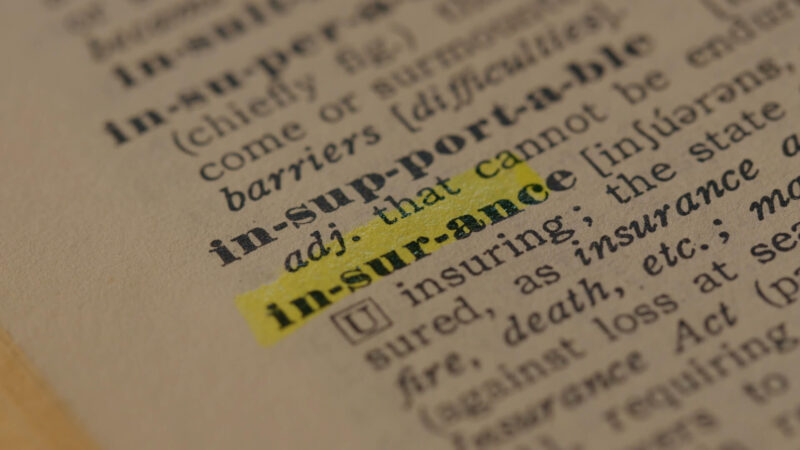The Florida 2-20 General Lines Property and Casualty Insurance exam is a formidable test that requires extensive knowledge and precise understanding from candidates. This exam is crucial for obtaining a license to sell property and casualty insurance in Florida and covers a broad spectrum of topics, including detailed policy provisions, state-specific regulations, and insurance terminology.
The difficulty lies in its detailed questions that demand not only a thorough grasp of the material but also the ability to apply theoretical knowledge to real-world scenarios. This article examines the factors that make the Florida 2-20 exam particularly challenging.
Why is the Florida 2-20 Exam Difficult?

- Broad Range of Topics: The exam covers a vast array of subjects, including property insurance, casualty insurance, policy provisions, contract law, and state-specific regulations. This wide scope requires candidates to have an extensive knowledge base and understanding of many different areas.
- Detailed and Complex Questions: The questions are highly detailed and often complex. They require a deep understanding of specific insurance terms, conditions, and scenarios. Candidates must not only memorize information but also understand how to apply it in practical situations, which can be very challenging.
- Comprehensive Policy Provisions: Understanding the intricate details of various policy provisions, including different types of coverage, exclusions, and endorsements, is crucial. The depth and specificity of these provisions make it difficult to recall and apply them correctly during the exam.
- State-Specific Regulations: The inclusion of Florida-specific regulations adds another layer of complexity. Candidates must be well-versed in local statutes, rules, and regulatory requirements that affect the insurance industry in Florida. These regulations can be intricate and detailed, requiring additional focused study.
- Application of Theoretical Knowledge: The exam tests candidates on their ability to apply theoretical knowledge to practical scenarios. This means understanding concepts at a deeper level and being able to use that knowledge effectively in real-world situations.
- High Standards for Passing: The passing score for the exam is 70%, which requires a significant level of accuracy and understanding. Achieving this score necessitates thorough preparation and a strong grasp of all the tested material.
Exam Structure and Format
| Number of Questions | 100 |
| Sections | Two sections of 50 questions each |
| Time Allotted | 4 hours |
| Question Types | Multiple-choice |
| Passing Score | 70% |
Topics Covered

- Main Topics: The exam covers essential areas for property and casualty insurance professionals, including property insurance, casualty insurance, policy provisions, contract law, and specific state regulations.
- Subtopics: Within these main topics, various subtopics are explored such as homeowners insurance, commercial lines, inland marine, automobile insurance, and workers compensation. Each subtopic demands detailed knowledge to answer exam questions effectively.
- State-Specific Content: The exam also includes state-specific content, focusing on statutes, marketing practices, and agent responsibilities. This section requires candidates to be well-versed in local regulations and legal requirements.
State-Specific Regulations

- Florida Statutes and Rules: The exam includes questions on specific statutes and rules that govern the insurance industry in the state. This includes regulations from the Department of Financial Services, guidelines from the Office of Insurance Regulation, and various legislative requirements that affect how insurance is sold and managed locally.
- Licensing Requirements: Understanding the process for obtaining and maintaining an insurance license is crucial. This involves meeting specific educational and professional criteria set by the state, such as pre-licensing education, background checks, and continuing education mandates.
- Agent Responsibilities: Insurance agents must adhere to defined responsibilities, including ethical practices, proper client communication, and compliance with regulatory standards. This ensures agents provide high-quality service while abiding by the legal requirements set by the state.
- Marketing Practices: The regulations also cover marketing practices. Agents must follow specific guidelines on how to market their services and products to avoid misleading or unethical practices.
- Insurance Guaranty Fund: The exam tests knowledge of the state’s insurance guaranty fund, which protects policyholders if an insurance company fails. Understanding the fund’s purpose and the procedures involved is essential.
- Financial Services Regulation: Candidates need to be familiar with the broader financial services regulation framework that impacts the insurance industry. This includes knowing the roles of various regulatory bodies and how they interact with insurance practices.
- Consumer Protection: The state-specific regulations include consumer protection laws designed to safeguard the interests of policyholders. Agents must understand these laws to ensure they act in the best interest of their clients.
Insurance Terminology

- Key Terms and Definitions: The exam tests candidates on a wide range of insurance terms and definitions. Understanding key terms like indemnity, deductible, premium, liability, and underwriting is essential. These terms form the foundation of insurance knowledge and are frequently used in both the exam and professional practice.
- Policy Types and Coverage: Candidates need to be familiar with different types of policies such as homeowners, automobile, and commercial insurance. Each policy type has specific terms related to coverage limits, exclusions, and conditions that must be understood.
- Legal Terms: Understanding legal terms related to insurance, such as subrogation, waiver, estoppel, and proximate cause, is also crucial. These terms often appear in questions related to claims and policy provisions.
- Contract Elements: Knowledge of the elements of a contract, including offer and acceptance, consideration, legal capacity, and lawful purpose, is necessary. These elements are fundamental to understanding how insurance contracts are formed and enforced.
- Risk and Hazards: Candidates must comprehend terms related to risk, such as insurable interest, peril, hazard, and loss. This includes understanding how different types of risks and hazards affect insurance policies and claims.
- Policy Provisions: Familiarity with standard policy provisions, such as declarations, insuring agreements, conditions, exclusions, and endorsements, is critical. These provisions define the scope of coverage and the responsibilities of both the insurer and the insured.
- Claims Terminology: Understanding claims-related terminology, such as proof of loss, notice of claim, appraisal, and salvage, is important. These terms are integral to the process of filing and settling claims.
- Regulatory Terms: Knowledge of regulatory terms, including compliance, licensing, and the role of regulatory bodies, is necessary. These terms help candidates understand the regulatory environment in which they will operate.
Common Pitfalls
- Focusing Too Much on Specific Topics: Candidates often make the mistake of concentrating on a few topics while overlooking others. The exam covers a broad range of material, so it is crucial to allocate study time evenly across all areas to avoid gaps in knowledge.
- Ignoring State-Specific Regulations: Not paying enough attention to state-specific regulations can result in missing important questions. Knowledge of local laws, licensing requirements, and specific regulations is essential, as the exam includes many questions on these topics.
- Misreading Questions: Many candidates misinterpret questions due to their complex wording. This can lead to incorrect answers. Practicing with sample questions and learning how to carefully read and analyze each question can help avoid this issue.
- Lack of Practice with Multiple-Choice Questions: Some candidates do not practice enough with multiple-choice questions, which can be a disadvantage. Knowing how to approach these questions, including strategies for eliminating incorrect answers and identifying trick questions, is key to performing well.
- Poor Time Management: Failing to manage time effectively during the exam can lead to rushing through questions or not finishing the test. It is important to pace yourself and allocate enough time to read and answer each question carefully.
- Inadequate Understanding of Policy Details: Another common issue is not fully understanding the details of various insurance policies. Comprehensive knowledge of policy provisions, exclusions, and conditions is necessary to answer questions accurately.
How to Prepare For Florida 2-20 Exam?

- Develop a Study Plan: Create a structured study plan that covers all the topics outlined in the exam syllabus. Allocate specific times for studying different subjects, ensuring that each area is given adequate attention. Consistency and regular review are key to retaining information.
- Utilize Quality Study Materials: Invest in high-quality study materials, such as textbooks, online courses, and practice exams. These resources provide comprehensive coverage of the exam content and offer valuable insights into the types of questions that will be asked.
- Join Study Groups: Consider joining a study group or finding a study partner. Collaborative studying can help clarify difficult concepts, provide support, and keep you motivated. Discussing topics with others can also reveal different perspectives and enhance understanding.
- Take Practice Exams: Regularly take practice exams to assess your knowledge and identify areas that need improvement. Practice exams help you become familiar with the format and timing of the actual test, reducing anxiety and improving performance.
- Focus on Weak Areas: Identify your weak areas through practice exams and targeted review sessions. Spend extra time studying these topics to ensure a well-rounded understanding of all the material. Addressing weaknesses is crucial for improving your overall score.
FAQs
How long is the validity of the Florida 2-20 license?
The Florida 2-20 General Lines license is valid for two years. License holders must complete continuing education requirements and renew their license every two years to maintain their eligibility to sell property and casualty insurance in Florida.
What are the continuing education requirements for the Florida 2-20 license?
License holders must complete 24 hours of continuing education every two years. This includes a mandatory five-hour law and ethics update specific to the license type and 19 hours of elective credits covering various insurance-related topics.
Can I retake the Florida 2-20 exam if I fail?
Yes, you can retake the exam if you do not pass on your first attempt. However, there is a mandatory waiting period of 30 days between exam attempts. Candidates should use this time to review and strengthen their knowledge in areas where they struggled.
Are there any prerequisites for taking the Florida 2-20 exam?
Candidates must complete a pre-licensing course approved by the Florida Department of Financial Services. Additionally, they must be at least 18 years old, a resident of Florida, and have fingerprints on file with the Department.
What career opportunities are available after passing the Florida 2-20 exam?
After obtaining the 2-20 license, individuals can pursue various career paths in the insurance industry, including roles as insurance agents, brokers, claims adjusters, and underwriters. This license allows professionals to sell a wide range of property and casualty insurance products, providing ample opportunities for career growth and specialization.
Last Words
The Florida 2-20 exam is a challenging test that requires thorough preparation and a deep understanding of various topics. Focus on all areas of study, practice extensively, and manage your time well during the exam to enhance your chances of passing. Good luck with your exam.




